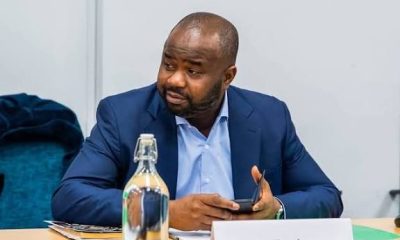Uncategorized
Locked out: Nigeria’s 5.1m people with disabilities and banking barriers

By Rasak Adekoya
Ada sat outside a bank in Anambra, gripping her automated teller machine (ATM) card as if it were a lifeline. She could hear the quiet hum of air conditioning inside, the rhythmic beeps of transactions being processed, and the occasional click of polished shoes against the tiled floor.
But for Ada, the bank’s entrance was an unyielding wall. The steps leading inside, the absence of a ramp, the heavy doors designed without thought for a wheelchair user—each one a silent message that she did not belong.
She waved at the security guard, who hesitated before sighing and calling a banker outside. “Madam, you should come with someone next time,” the official muttered, barely meeting her eyes. Ada swallowed her frustration. Next time. As if she had not spent a lifetime battling barriers that others barely noticed.
Ada’s story is the reality of millions. According to the National Bureau of Statistics (NBS), at least 8 percent of Nigeria’s 128 million adult consumers—5.1 million people—live with disabilities. Yet, the financial industry continues to treat them as an afterthought. Banking halls remain inaccessible, ATMs are designed without consideration for the blind, and even something as simple as obtaining a debit card can become a humiliating ordeal.
Burden of assumptions
Too many financial institutions perceive people with disabilities as charity cases, and their economic potential is dismissed before it is even considered. But reality tells a different story.
Take Chuka, a visually impaired entrepreneur in Lagos. When he applied for an ATM card, the bank manager refused, citing “security concerns”. Instead, Chuka was asked to sign an affidavit absolving the bank of any liability should he “misuse” his card.
Meanwhile, his sighted peers simply signed a form and walked out with theirs. This assumption—that people with disabilities cannot manage their finances independently—traps them in a cycle of exclusion and dependence.
Economic and ethical imperative
Banks measure success in two ways: economic performance and ethical reputation. Both suffer when a significant portion of potential customers is locked out.
Let’s break down the numbers. If just half of Nigeria’s 5.1 million adult persons with disabilities were actively banked, saving as little as ₦20,000 monthly, the total annual savings would amount to ₦1.2 trillion—more than the combined 2024 annual budgets of Ekiti and Osun states. This excludes the financial activities of carers and family members who prefer to engage with businesses that support accessibility.
Beyond profit margins, there is the matter of ethics. All Nigerian banks have signed the National Sustainable Banking Principles, which emphasise environmental, social, and governance (ESG) considerations. Yet, these principles remain vague when it comes to disability-specific interventions. A bank’s commitment to inclusion cannot exist solely in its corporate social responsibility (CSR) reports—it must be evident in its operations.
A glimpse of progress
Not all banks are blind to the issue. Access Bank and Standard Chartered have introduced disability-inclusive banking initiatives. Sterling Bank has taken steps to employ persons with disabilities. But these efforts, while commendable, remain the exception rather than the norm. True inclusion demands more than token programmes—it requires a systemic shift.
Learning from global best practices
Nigeria does not need to reinvent the wheel. Countries like Kenya, South Africa, and the United Kingdom have successfully implemented disability-inclusive financial ecosystems. Here’s what must change:
- Regulatory action: The Central Bank of Nigeria (CBN) must update the National Financial Inclusion Strategy to explicitly include disability-specific policies. This means enforcing accessibility standards in bank branches, requiring disability sensitivity training for staff, and ensuring banking apps and websites meet Web Content Accessibility Guidelines (WCAG). ATMs should have interactive voice prompts and braille keypads for visually impaired users.
- Human-centred design: Financial products must be designed with input from persons with disabilities. UBA’s introduction of Braille account opening forms was well-intentioned but impractical—blind users cannot submit forms in Braille. Instead, banks should prioritise accessible digital onboarding processes.
- Inclusive financial programmes: Government agencies and non-governmental organisations promoting financial literacy must ensure their programmes explicitly include persons with disabilities. Start-up funding initiatives should require bank accounts for entrepreneurs with disabilities, reinforcing their economic participation.
- Accessible currency: The CBN, in collaboration with the Nigeria Minting and Printing Company, must make currency more accessible for the blind. In the UK, for example, banknotes have tactile markings that help visually impaired individuals distinguish denominations independently.
Beyond inclusion—A future of economic empowerment
Nigeria’s financial sector stands at a crossroads. The exclusion of people with disabilities is not just a matter of fairness—it is an economic miscalculation. An inclusive banking system does not only serve the disabled; it strengthens the economy, fosters innovation, and expands the customer base.
It is time for financial institutions to stop seeing persons with disabilities as burdens and start recognising them as economic actors. Not as recipients of charity, but as contributors to a thriving economy. Not as problems to be managed, but as customers to be served.
For Ada, for Chuka, and for the millions like them, the doors to financial independence must open—not just in words, but in action.
Rasak Adekoya is a disability inclusion specialist and author of four books. With extensive experience in promoting the economic inclusion of people with disabilities across African countries, he advocates for policies that foster accessibility and equal opportunities. He contributes opinion pieces on disability rights and economic empowerment.
Uncategorized
NUPRC’s Digital Compliance Systems, Licensing Reforms Positioning Nigeria for Stronger Energy Investment, says BusinessMetrics
BusinessMetrics, an independent industry performance evaluator, says the Nigerian Upstream Petroleum Regulatory Commission (NUPRC) is delivering sustained progress in the implementation of the Petroleum Industry Act (PIA), with reforms that are strengthening investor confidence, deepening transparency and repositioning the upstream industry for long-term growth.
In a statement released on Monday, BusinessMetrics said its latest sector review shows that NUPRC’s regulatory measures over the last year “reflect a deliberate shift toward predictable, technology-driven and investment-friendly governance,” noting that these improvements are already reshaping Nigeria’s competitiveness in the global energy market.
According to the statement, one of the Commission’s most significant achievements is the rapid digitisation of oversight systems that monitor production, metering accuracy, fiscal obligations and environmental performance.
BusinessMetrics said these digital tools have “reduced reporting delays, improved data integrity and enhanced the global credibility of Nigeria’s upstream statistics”.
“The availability of reliable, real-time data is one of the strongest indicators of a trustworthy investment climate,” the organisation said.
“NUPRC’s digital reforms are raising confidence among operators and international financiers who rely on transparent information before committing capital to new field developments.”
The evaluator also noted improvements in licensing and regulatory approval processes, describing the Commission’s approach as more structured, rules-based and commercially coherent compared to previous years.
“Clearer timelines for approvals, structured consultations with operators and the alignment of regulatory decisions with PIA provisions have created a more efficient operating environment,” the firm said.
“This is enabling quicker movement on projects, reducing administrative bottlenecks and giving investors greater clarity on regulatory expectations.”
The organisation said fiscal clarity under the PIA, implemented through NUPRC, has equally enhanced the attractiveness of Nigeria’s upstream assets, leading to renewed activity around marginal fields, reactivation of dormant licences and fresh commitments from both indigenous and international operators.
“The fiscal certainty introduced by the PIA continues to incentivise capital deployment. We are seeing a gradual resurgence in upstream investment appetite, driven by the clarity and predictability that investors have long demanded,” the statement added.
On gas development and decarbonisation, BusinessMetrics commended NUPRC’s enforcement of domestic gas delivery obligations and its frameworks for flare-gas commercialisation, saying these efforts are opening new growth corridors for Nigeria’s energy transition.
“The Commission’s work in gas monetisation is particularly impactful. It supports industrial expansion, contributes to power stability and positions gas as a central pillar of Nigeria’s economic transformation,” the statement added.
The evaluator further highlighted progress in customer-facing reforms, including the strengthening of the One-Stop Regulatory Centre, which it described as a crucial tool for reducing red tape and improving the ease of doing business in the upstream sector.
“This approach aligns with global best practices and signals institutional willingness to reduce friction for investors,” BusinessMetrics noted.
While acknowledging the complexity of Nigeria’s upstream environment, the organisation said the Commission’s consistent delivery on its mandate is helping restore confidence in the sector.
“With sustained implementation of the PIA, Nigeria is better positioned to compete for global capital, increase production capacity and advance long-term energy security,” the organisation said.
BusinessMetrics concluded that NUPRC’s progress “sets a solid foundation for deeper reforms” and urged continued institutional discipline, innovation and investor-focused regulation to fully unlock Nigeria’s upstream potential.
Uncategorized
Forgive your blackmailers and focus on helping Mr. President deliver on his security agenda, group tells Minister Matawalle
The Ambassadors for Peace and Progress (APP) has appealed to the Minister of State for Defence, Dr. Bello Mohammed Matawalle, to forgive the five individuals who publicly confessed to running a N500 million smear campaign against him while he was governor of Zamfara State.
Addressing journalists at a press conference in Abuja on Sunday, the National Coordinator of the group, Rev. Matthew Adejoh, urged the minister not to allow the painful betrayal to distract him from the critical national assignment entrusted to him by President Bola Ahmed Tinubu.
“We followed with deep emotion the courageous confession made by Comrade Aryan Abdul Kareem and his colleagues. Their admission has exposed the depth of political desperation in Zamfara State, but it has also opened a rare door for healing and reconciliation,” Rev. Adejoh said.
Describing Dr. Matawalle as “a peaceful, kind and large-hearted leader who is a friend to everyone,” the cleric appealed to him to extend the same hand of fellowship he has always shown to people of all faiths.
“Dr. Bello Matawalle is known across the North as a man who builds bridges, not walls,” he said. Quoting Colossians 3:13, he added: “Bear with each other and forgive one another if any of you has a grievance against someone. Forgive as the Lord forgave you.
“These young men have fallen on their knees in public and begged for mercy. As believers and as patriots, we plead with His Excellency to forgive them and everyone who was paid to destroy his name.
The bandits ravaging our region do not read sponsored articles — they only respect superior resolve and unity of purpose.”
The Ambassadors praised President Tinubu for appointing Matawalle, saying the elevation was divine recompense for years of wicked blackmail.
“Your enemies spent over half a billion naira to pull you down, yet Allah raised you to the very centre of Nigeria’s war against terror. Let this confession be the final burial of that evil plot,” Rev. Adejoh declared.
While calling on the EFCC, ICPC and security agencies to immediately investigate the allegation that Zamfara State funds were used to sponsor media attacks, the group insisted that Dr. Matawalle himself should choose the path of forgiveness.
“Let justice run its full course, but let our dear Minister show the maturity, kindness and large-heartedness that made President Tinubu bring him to Abuja. Forgive them, Your Excellency. Focus all your energy on helping Mr. President end insecurity forever. That is the greatest victory.”
Uncategorized
Accountability Centre Lauds NNPC’s N5.4trn Profit, Says Ojulari Has Set New Benchmark for Public Sector Performance

A policy advocacy group, the Centre for Energy Accountability and Reform (CEAR), has commended the Nigerian National Petroleum Company (NNPC) Limited for declaring a Profit After Tax of N5.4 trillion for the 2024 financial year.
The Centre described the performance as “an unmistakable affirmation that Nigeria’s oil industry is finally responding to disciplined management and modern commercial reforms”.
In a statement issued on Friday in Abuja and signed by CEAR’s Executive Director, Dr. Ibrahim Ahmed, the centre said the latest results released by GCEO Bayo Ojulari represent the strongest demonstration yet that the company’s drive toward operational efficiency, transparency and investment expansion is yielding measurable outcomes.
NNPC recently announced the 2024 Profit After Tax during a briefing in Abuja, confirming a 64 percent year-on-year jump from the N3.297 trillion recorded in 2023. Revenue also rose sharply to N45.1 trillion, reflecting an 88 percent surge, supported by higher production volumes and strengthened downstream reforms.
CEAR said the results validate the company’s transformation since it became a limited liability company, crediting Ojulari’s leadership for stabilising operations, tightening cost structures and restoring investor confidence at a time when global capital is increasingly sensitive to governance standards.
“This profit performance is not accidental. It reflects a deliberate, disciplined shift in how NNPC Limited is run—one that prioritises efficiency, transparency and commercial viability. Under Bayo Ojulari’s watch, the company has shown that a national oil company can be profitable, globally competitive and strategically aligned with national development goals,” the statement reads.
The Centre said the ongoing reforms across the upstream, midstream and downstream sectors are beginning to correct years of inefficiency, vandalism, under-investment and regulatory conflict.
Ahmed noted that the financial results align with the Renewed Hope Agenda of President Bola Tinubu, particularly the push for fiscal sustainability and improved sectoral governance.
While acknowledging the decline in foreign exchange earnings reported in the 2024 statement, the Centre said the shortfall underscores the need for sustained reforms to boost production, expand gas output and deepen value-addition rather than crude export dependency.
“The path to long-term stability must be investment-led and production-driven. NNPC Limited’s plan to raise crude output to two million barrels per day by 2027 and three million barrels per day by 2030 is the type of ambition the sector requires. Likewise, the move to scale gas production to 12 billion standard cubic feet per day by 2030 shows strategic foresight,” the statement added.
CEAR also praised the company’s plan to mobilise $60 billion in new investments across the value chain, saying such an expansion will be critical for job creation, revenue growth and anchoring Nigeria’s energy transition.
“With this performance, NNPC Limited has sent a clear message that Nigeria’s energy sector can work, and work profitably, when guided by clear vision and competent management,” Ahmed said.
The Centre urged regulators, industry players and political actors to avoid distractions and continue supporting the reforms that are restoring credibility to Nigeria’s petroleum value chain.
-

 News3 months ago
News3 months agoCSOs fault DAPPMAN’s ₦75 per litre coastal freight cost demand
-

 Uncategorized1 month ago
Uncategorized1 month agoParacetamol Use in Pregnancy Doesn’t Cause Autism, New Study Confirms
-
Uncategorized3 months ago
Consumer Forum Urges FG, DSS to Investigate Desperate Efforts by PENGASSAN to Shut Down Dangote Refinery
-

 News3 weeks ago
News3 weeks agoBreaking: FBNQUEST: Nestoil and Neconde are not under any receivership
-

 News3 months ago
News3 months agoCSOs To Tinubu: Hold DAPPMAN, Labour Unions Responsible For Breakdown Of Law, Order
-

 News1 month ago
News1 month agoCoalition Backtracks, Apologises To FIRS Chairman Adedeji Over False Allegations
-
News1 month ago
NGO Empowers 150 Girls with Disabilities in FCT to Promote Inclusive Education
-

 Uncategorized2 months ago
Uncategorized2 months agoSowore and Divisive Anti-Democratic Forces Must Be Stopped; Enough is Enough-ACN



